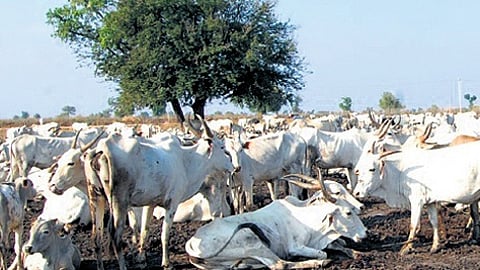Government must protect animals from drought
It has been a dry and difficult year for most parts of the country, with the vagaries of a whimsical monsoon teaching us a few lessons in austerity. Karnataka, especially Bengaluru city, is on the brink of rationing water, with curbs on using precious potable water for washing cars and watering plants. While the drought has taken a toll on agriculture and left farmers in debt, it has also led to distress among wildlife whose habitats have dry water holes and sparse fodder.
It’s been a merciless summer without any spring showers—140 dry days on the trot—leading to a heat wave alert. Four elephants have died of heat-related causes and dehydration in the past few days in southern Karnataka, which is an indication of the condition of waterbodies in the forests.
While human beings are banking on technology to keep the water flowing until the situation improves, animals in forests are at the mercy of nature. Drought, and especially lack of water, leads to mass migration among both humans and animals—humans move towards cities in search of livelihood, while animals are forced to travel long distances looking for basic sustenance and water, and often enter human habitations, leading to conflict.
The forest department does its bit to ensure that waterholes are filled up by installing solar pumps, which are powered by solar panels to pump water from borewells deep in rural areas and forests. Yet, this is not enough and does not ensure there is adequate fodder for herbivores. Likewise, crop damage across 40 lakh hectares in the past year in Karnataka is bound to lead to a food shortage in the coming seasons, affecting GDP and per capita income.
Conservation experts point out that such animal deaths are an indication that long-term measures are necessary to stave off an impending natural disaster. Humans play a big role in bringing on drought and exacerbating heat conditions by the indiscriminate use of land and water, change of forest land use, deforestation and destruction of catchment areas. It is time to stop and place checks on the exploitation of natural resources and degradation of animal habitats.
The authorities have recognised the need for afforestation, with Karnataka Chief Minister Siddaramaiah directing the forest department to increase forest regions from 20 percent of the total land area of Karnataka to 33 percent, to prevent extreme weather conditions. While there is good news of a normal monsoon this year, we must not forget the trials of the past year with the first showers.

